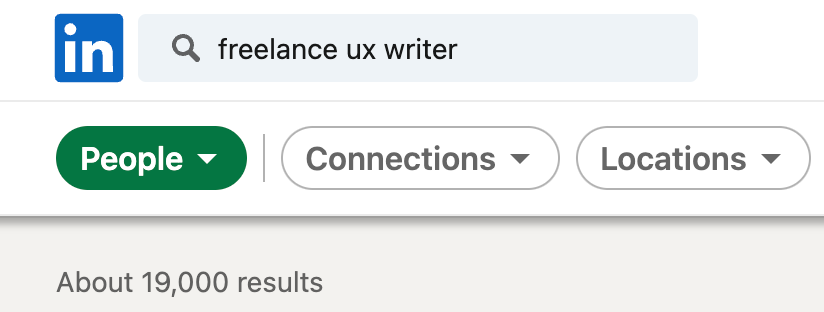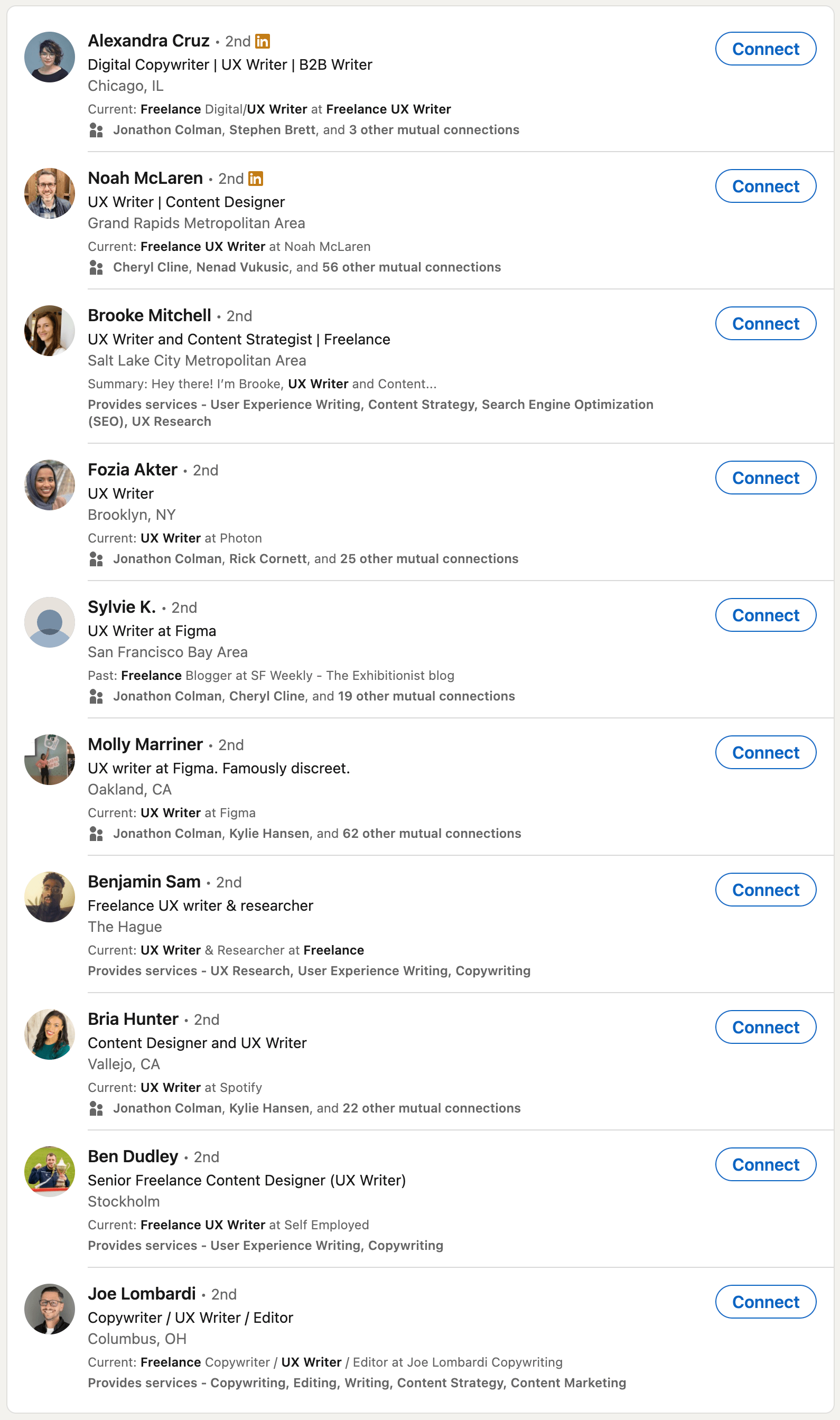Let's be real — there are a lotta UX writing freelancers out there. And the number is only growing. It's getting (and will continue to get) harder and harder to stand out as a freelancer.
Just look at LinkedIn:

There are (approximately) 19,000 freelance UX writers on LinkedIn.
Now, if I'm Businessman Joe looking for some fresh new words, how in the world would I know who to reach out to?

Every headline says “Freelance UX writer” or some variation “UX writer | Content Designer” and so on. How do I know if I should click on “UX Kevin” or “Senior UX Kate”?
Unfortunately, Businessman Joe is probably going to only click on freelancers based on their search ranking and maybe if he likes their photo.
Now, imagine a different search result. Instead of seeing “Freelance UX writer” after “Freelance UX writer,” Joe sees:
Freelance UX writer for growing startups | Grow fast with words that resonate with the right users
Now THAT gives businessman Joe something to latch on to. As a founder of a growing startup, it's now somewhat clear how the person behind this profile can help.
Now, Joe has an incentive to click on the “Freelance UX writer for growing startups” instead of the “Freelance UX writer” because, in just a few words, it’s more clear how this person can help him.
THIS is why you need a personal brand. Well, this is just one reason. There are a few.
Every freelancer needs a personal brand because it’ll:
- Help you stand out from the crowd, which means more leads
- Make your offering crystal-clear, so you can crush sales calls
Hold up — what’s a personal brand, Slater?
Good question. I’ll step back for a second and define what a personal brand actually is.
A personal brand is a promise you guarantee. It encompasses what you do, who you do it for, the value you deliver, and what makes you different from the next guy.
It's Coke vs. Pepsi. iOS vs. Android. Having a distinct personal brand gives your presence an opinion, which helps you attract the right clients.
Literally, a personal brand is:
- Who you're for (your target client)
- What you're an expert in (your niche)
- The unique value you offer (your messaging)
Who you're for (your target client)
Your personal brand revolves around your target client (aka your ideal customer.) By being specifically and intimately relevant to a specific person, you're more likely to sell to that person. That's because if you're for everyone, you're for no one.
Have you ever gotten an ad or seen a website that was so relevant to your problem you signed up ASAP? That's likely because you were that companies target customer. And we want to create the same effect for your freelance biz.
We'll dive deep into defining your target client in the next lesson, btw.
What you're an expert in (your niche)
A niche is a specific industry or area you specialize in. It transforms you from “Freelance UX writer” to “Freelance UX writer for edtech startups.”
Clients have told me time and time again they're looking for experts to come in and solve their problems. They don't have the time to onboard someone and get them up to speed on the ways of their industry.
That's why a niche is so critical to your personal brand — it gives you a space to own, makes it crystal clear what you're an expert in, and immediately clarifies how you can help better than someone else.
The unique value you offer (your messaging)
Messaging is the superpower behind personal branding. Having defined messaging makes things like writing a LinkedIn bio or a website super easy.
Instead of having to think about what to say, your messaging do the hard work. Your messaging describes the value you offer on top of your offering.
For example, “website UX copywriting” is an offering. Your messaging go a layer deeper to connect with someone and answer how you can solve their pain point.
Because of that, with messaging, you need to know a bit about your potential clients. For example, for a time-strapped Product Manager who hates writing microcopy, your messaging could be:
Tired of writing UX copy that doesn't convert? With a pro like me by your side, not only will you increase conversion, but you'll get time back to do the things you actually want to focus on.
If you're a fintech UX writer, instead of simply offering “website UX copywriting,” you could offer:
Getting a lot of drop-off on your home page? In my 5+ years in fintech, I've found that's pretty common because most fintechs don't differentiate their brand voice and don't use comforting messaging when talking about safety and security (if they talk about it at all.) I've turned around home pages for your competitors like Chime and Afterpay, and I'd be happy to do the same for you.
Once you hash out your messaging, writing and talking about what you do is cake. That said, this requires some up front work. I don't recommend sitting down to do your website and figuring out your personal brand on the spot.
Ok, that makes sense. So how is this going to 5x my business?
Here’s how:
A personal brand separates you from the crowd, which gets you leads. This gives someone a reason to reach out to you first, and makes it effortless for you to describe what you do in a way guaranteed to sell.
With a personal brand, every question asked and social media post becomes effortless because you've got your identity down pat. You’ll have an excellent grasp of what you offer, your clients will understand how you’re different, and your unique place in the market will get the sales raining in.
Let’s walk through it.
Say you’ve already hooked a potential client because they saw on LinkedIn you’re a “Freelance UX writer for fintech apps” vs. “Freelance UX writer.” You want to keep the party going on your website. This is where your personal brand can really shine.
Someone without a personal brand would have website copy that reads something like:
Hi, I’m Slater. I'm a freelance UX writer that writes websites, emails, and flows. How can I help?
One with a fintech personal brand would read:
I've 10xed conversion on websites, emails, and flows for fintech apps just like yours with words alone, and I can help you gain confidence with words that build trust. Find out how.
If I work at a fintech app, I'm going to be much more interested in the person with fintech expertise because they’ve made it clear how they can solve my problem.
OK — so you've convinced someone with your personal brand, and they reach out. Your personal brand is the gift that keeps on giving, because it's going to build the backbone of the easiest sales call you'll ever have.
Instead of stumbling to describe what you do and your process (which clients don't care about anyway,) your personal brand comes with a pitch that describes how you can solve their problem like a pro.
On the sales call, instead of saying:
I'm a freelance UX writer. I do websites, emails, and flows. I've done so for companies like Netflix and Fitbit, and I can help you, too.
You say:
In my 5+ experience in fintech, I've learned a lot of users struggle to trust and feel safe using fintech apps. I use words to build trust on websites, emails, and flows, which makes it super easy for users to make decisions. I've increased conversion for some of your competitors like Chime and Afterpay, and I'm confident my fintech expertise can make a dent in your metrics, too.
Having a personal brand makes the sales call less about you and more about the potential client because it magically becomes centered around their problem.
And that's really all they care about.
Concerned this will limit your pool of clients? It might, but your hit rate will be much higher.
I'm a case study of this. I started my freelance business with a fintech personal brand (now you know where the example came from 😉,) and I pretty quickly landed clients like Verizon financial services, Afterpay, Chime, and more.
I'm here to be real, and humblebrag, ~94% of my sales calls result in a price negotiation or a hit. The other ~4% usually end up not working out because I was too expensive or their project changed.
~1% of the time it doesn’t work out because someone else was a better fit, perhaps with a more relevant personal brand (wink, wink.)
Happy UX writing 🖖





